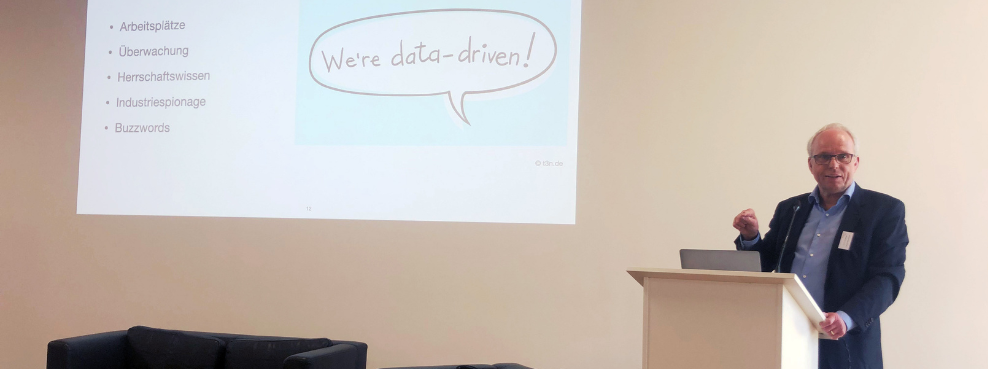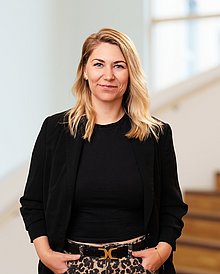Opportunities and limits of digitalisation: digital solutions cannot replace communication and a good working atmosphere
Scientific project at Witten/Herdecke University on the topic of digitalisation in companies comes to an astonishing conclusion.

If you take a look at the changes in the world of work, it becomes clear: whether machine control, digital routing cards, shop floor info points or modern knowledge management - none of the digital measures have completely solved operational problems in the long term, but they have created new tasks and challenges. Most companies are faced with the dilemma of wanting to introduce the most efficient electronic programmes on the one hand, but not wanting to become dependent on hardware, software or service providers on the other. Employees fear for their jobs, management fears for its control options and management fears for the autonomy of their company.
"When it comes to digitalisation projects, everyone involved needs to communicate with each other, not just the management, for example. Innovation only arises from a process that is not taken for granted. You need the courage to rediscover your own company. You have to learn how to deal with the programmes and with the new organisational formats that these programmes almost inevitably entail," says project manager Prof. Dirk Baecker from UW/H. "And you always have to reckon with the fact that the real intelligent solutions are lying dormant in employees' drawers. That's why we need to ensure a working environment in which intelligence is made available to the company," adds Dipl.-Ing. Carsten Meinhardt, Production Manager at nass magnet GmbH and one of the project partners.
Digitalisation makes communication in companies more complex and important
"In my view, the most important result of this project," says Tom Henning, Managing Director of project partner SHA Anlagentechnik GmbH, a hidden champion in screw conveyor construction, "is that we have far more interfaces between people and machines, as well as between employees and departments, than we previously thought. For this reason alone, more people have to talk to each other than we are used to. This results in a huge learning process in which we have to keep finding out when we should open it and when we can close it." In his closing remarks, Dr Otto F. Bode, Head of Department at the Federal Ministry of Education and Research, also emphasised that communication often has a greater impact on those involved than they are aware of. It was worth looking at this in the project.
Understanding communication as a separate "item" in digitalisation is therefore a core message of the project to practitioners. This is the only way to make the leap from the still prevalent, purely purpose-oriented "tool perspective" of digitalisation to a system perspective that both allows and demands that the company as a whole be put to the test.
About the "KILPaD" research project
For three years, the BMBF-funded project "Communication, Innovation and Learning in Production Organisation under Conditions of Agile Digitalisation (KILPaD)" investigated the future of work. Prof Dr Dirk Baecker, Maximilian Locher and Hannah Cramer from Witten/Herdecke University (UW/H) collaborated with Prof Uwe Elsholz and Martina Thomas from the Department of Lifelong Learning at the FernUni Hagen. They were joined by five medium-sized companies as well as the Zukunftsallianz Maschinenbau, the VDI Technologiezentrum, the organisational consultancy OSB and the University of Constance with the theoretical computer scientist Prof. Kosub. The results from a scientific and operational perspective have now been compiled and the joint consensus presented at a closing event.
The scientific starting points of KILPaD have already been published in the volume "Parallele Welten der Digitalisierung im Betrieb", edited by Dirk Baecker and Uwe Elsholz at Springer Verlag. The second volume, with the working title "Postdigital Management", is expected to document the practical results and the resulting guidelines and recommendations in spring 2023. Initial practical findings are available on the kilpad.de website, the associated podcast "schnitt.stelle"(https://wissenschaftspodcasts.de/podcasts/schnitt.stelle-der-kilpad-podcast/) and in the instructional videos(https://www.youtube.com/channel/UCgSr1RWwth6-ZxVCxGUPYTg) that were created as part of the project.
Photos for download
Contact person

Svenja Malessa
Press Officer
Administration | Communication & Marketing
Alfred-Herrhausen-Straße 48
58455 Witten
Room number: 2.F05
